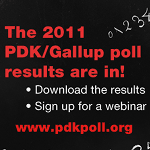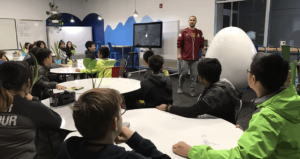PDK/Gallup Poll: Surveys Look Back, Innovators Look Forward

Surveys reflect the questions asked. The annual Phi Delta Kappan International (PDK) and Gallup poll asked a bunch of rear view mirror questions and got unsurprising responses: the public appreciate teachers, local schools, and school choice. The survey reflects broad concerns about public education and budget cuts in particular.
Milton Chen, George Lucas Foundation, reported nearly unanimous support for digital learning, “91% believe that providing all students with access to the Internet is important. They see its benefits in leveling the playing field of course offerings for smaller and rural schools, improving students’ motivation, and preparing them for college and career. The public has spoken. It’s now time for public education to listen to its public.”
Here’s three conclusions PDK got wrong about digital learning:
- PDK draws the wrong conclusion about online learning. The fact that half the parents don’t want shorter school days doesn’t mean they don’t want digital learning, I think they just appreciate the custodial aspect of schools.
- The vote was split on whether kids should have their own computer at school. Funny thing is, most of them already do, we just don’t want to admit it and we refuse to let them use it for schoolwork. I’ll give you a hint: It’s the phone they keep in their backpacks and check under the desk.
- Survey rationale for computers in the classroom included a vague notion of college readiness (the top response) but failed to mention personalized learning—which will prove to be the most important factor in helping students learn more, faster.
I appreciate that they have taken steps to update the survey, but it was written from the standpoint of adding computers to the schools we have. It’s clear that we need more effective and visible examples of schools that incorporate the best of onsite and online learning. Had the survey questions been more reflective of the Digital Learning Now report released last December, also highlighted within the survey results, there may have been more innovative and effective responses.
Surveys can provide an interesting snap shot, but they aren’t a guidance system. Innovation isn’t created by looking in the rear view mirror; it is derived from insight about unmet needs. Yesterday I meet with edupreneurs boosting reading comprehension, a second group that will send more kids to college, and a third group building an innovative, open online curriculum. They are all working at the intersection of emerging opportunities and massive needs. I found their insights more useful than the survey. And their work makes me far more optimistic about the future of American education.
Tomorrow I’ll be in Washington DC with Governor Wise to give our opinions on the survey results at the Public Perception of U.S. Education event. More info here.







0 Comments
Leave a Comment
Your email address will not be published. All fields are required.